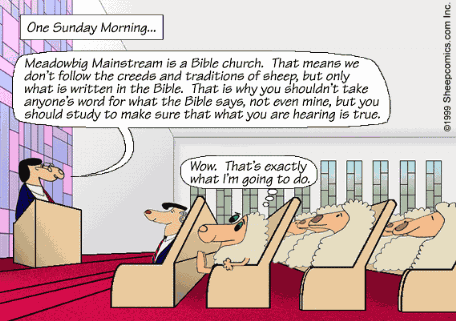
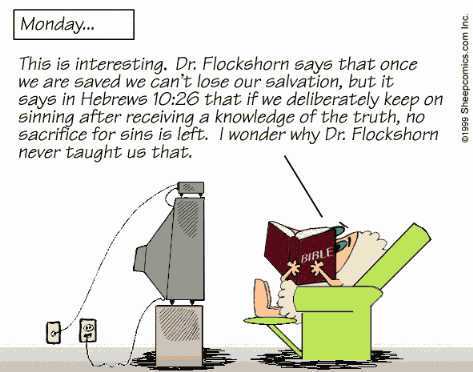
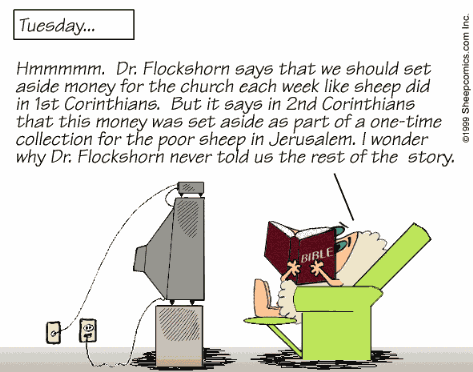
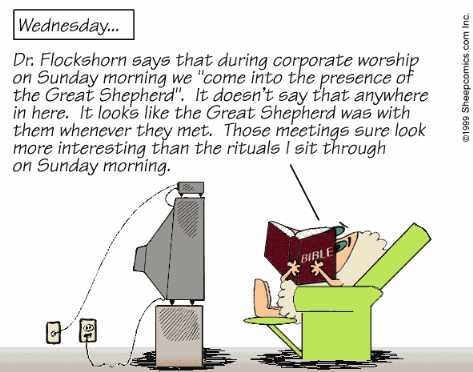
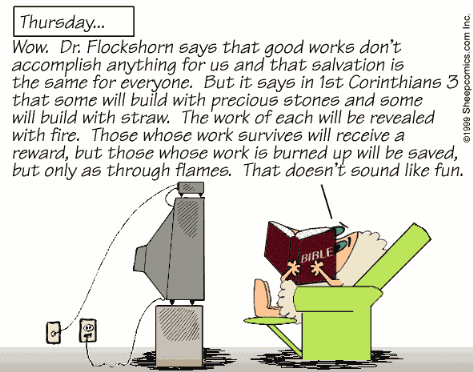


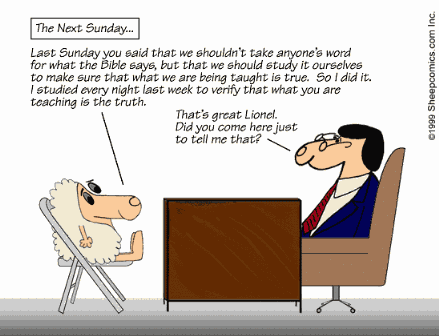


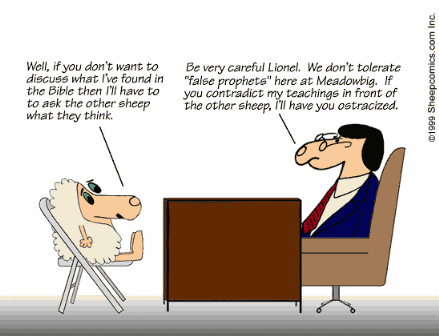



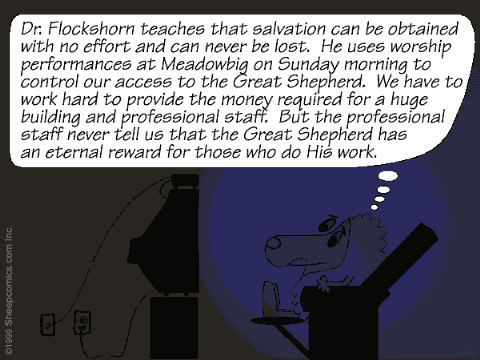


Editorial Notes
One Sunday morning Lionel is challenged to make the Bible his only authority and to check the Bible to make sure that everything he is taught is scriptural. Lionel takes this to heart and spends the next week verifying everything he remembers being taught at Meadowbig Mainstream Church.He finds quite a number of teachings he cannot verify, so he decides to discuss them with Dr. Flockshorn. Lionel expects Dr. Flockshorn to be impressed, but Dr. Flockshorn is indignant. Dr. Flockshorn knows he is always right about everything. Anyone who disagrees or questions his teachings must be out to cause trouble. Lionel is warned to keep his findings to himself or risk being ostracized.
Lionel does not consider being “disfellowsheeped” much of a threat since few of the sheep at Meadowbig talk to him anyway. Dr. Flockshorn realizes that he has nothing else to threaten Lionel with, but takes comfort in the fact that Lionel can’t do much harm anyway. Lionel’s looks, demeanor, wardrobe, and vocation are so far from what the sheep at Meadowbig have been conditioned to expect in a “church leader” that Lionel can say anything he wants to anyone and nothing will come of it.
Lionel is discouraged and decides that his best course of action is to shut up, conform, and stay out of trouble. That ends the confrontation, but it doesn’t end the lingering doubts in Lionel’s mind about what this “church business” is all about.
And we still don’t know why this strip was entitled “Berean Lionel”.
What is a “Berean”?
Just what is a Berean, and who cares anyway? Well, if I hadn’t heard about and then read about the Bereans, you wouldn’t be reading Sheep Comics™ cartoons. Many years ago I was introduced to the Bereans during a sermon. One of the cities Paul and Silas stopped at during their missionary journeys was called Berea, and the people who lived there were called -- you guessed it -- Bereans. (See Acts 17:10 - 12)
The people of Berea were considered noble; more noble than the people in Thessalonica, which was the city Paul and Silas had just left in haste. They were considered noble because they received the teaching of Paul and Silas with great eagerness, and they studied their Scriptures (what we now call the Old Testament) daily in order to verify the words that they were hearing.
Today we have a lot of half-Bereans. Many eagerly accept the word of anyone who looks good in a mix-and-match suit and can get a job speaking at a church building, but they don’t do the study and verification step. (After all, anyone who can speak well and comes with a good wardrobe and nice chunk of real-estate can’t be far from God, can he?) Add a "worship team" to provide entertainment and some doctrinal formulas to rationalize it all and you've got the makings of a fine church system.
I believe this is one reason why there are thousands of different “Christian” groups which don’t talk to each other but claim to follow Jesus. It’s a lot easier to follow a system which claims to please God than it is to find out what really pleases God and then try to do it.
The church systems that offer a huge building, quality entertainment, and a charismatic figure-head personality seem to be doing really well these days. I’m not saying that there is anything inherently wrong with a big building and a charismatic speaker. But the better a church system is at creating a show that appeals to the senses and emotions, the more important it is to verify that what is being taught is true. The people in the Bible who followed Jesus weren’t there for the entertainment.
I don’t believe that all our differences would just go away if everyone knew a lot of Bible, but maybe we would at least be able to talk about our differences, and the conversations might last for hours instead of minutes.
Now back to the story. The years continued to pass after I was introduced to the Bereans. I accumulated more bible knowledge (and a “Bible Degree”) as I racked up more years “going to church”. I listened to what was taught, and I did my own research. I found, to be blunt, that a lot of what is now mainstream doctrine seems impossible to verify in the Bible. At best, much of the current mainstream teachings start with the truth but they either don't complete it or they go beyond it. The verification step is what caused me trouble.
My "Berean" Experiences
The cartoon entitled “Berean Lionel” contains the best of my Berean experiences. When I say “best” I really mean “worst”. These were the experiences which accumulated in my mind to form my disillusionment with the “church system”. They occurred over the years at different churches, but they all occurred at churches that taught that we should not just believe what someone tells us about the Bible, we should be like the Bereans and verify that what is being taught is true. But first, here is a bit of irony I didn’t include in the cartoon.
One of my first experiences occurred when I studied that passage I mentioned above (Acts 17:10 - 12). This passage was used as a prooftext to show that good Christians should study the Bible every day. But the Bereans weren’t considered noble simply because they opened up the Scriptures (their scriptures were the Old Testament) and read them every day. Their nobility came from verifying the truth of Paul and Silas’ teaching. In other words, it was the purpose that was noble, not the process. Here I learned a lesson about church systems. It is very common to refer to a scripture to validate a process that one must conform to, while the purpose gets left behind in the text.
Once saved, always saved, (unless you weren’t saved)
I once attended a “new Christians class” at a very large church because I was curious about what their doctrine really was. Sometime during this class, I was warned that anyone who contradicted the doctrines taught would be considered a “false prophet” and that the presence of “false prophets” would not be tolerated at this church.
One of the points the teacher made was something like “once you’re saved, no one can take away your salvation, not even you”. We then dealt with the case where someone “gets saved” and then reverts to a state of total depravity. In this case, it was explained, that person wasn’t really saved to begin with.
I am amazed anyone can teach this and keep a straight face. It’s like the space-time continuum works differently when we “get saved”. I can do exactly and with all sincerity what the church system leaders tell me to do to “get saved”, but if later in life I turn away from God and God has no place in my life, then I never really got saved in the first place. Then I suppose the right thing to do would be to “get saved” for real and try it again.
The writers of the New Testament had something to say about losing salvation. No, no one can lose it for us, but yes, we can lose it for ourselves. The writer of Hebrews (in chapter 10 verses 26 through 31) says that if we willfully continue to sin after receiving the knowledge of the truth, no sacrifice for sins remains. All that remains for us is the terror of falling into the hands of the living God. I was never taught this at church; I had to find it myself. I wonder why.
At the end of 1 Corinthians 9, Paul creates an analogy with running, boxing, and making his body his slave so that after he has preached to others, he himself would not be “disqualified”. Paul then speaks of the example set by the Israelites who came out of Egypt. They were all “baptized” and ate the same spiritual food and drink, but most of them did not please God and ended up dying in the wilderness. Paul says this is an example to us. These are terribly forceful words to write to people who could never lose their salvation. The good news is that as long as we are alive, we can repent.
Set it aside and forget it
I have spent much of my Christian life at churches where the leadership claim to have restored New Testament Christianity. Most of these “New Testament” churches have big buildings and professional staff just like the “denominational” churches, and therefore large appetites for cash.
One teaching that I heard many times was that we should “set aside” money for the “collection of the saints” just like the New Testament church did in the first century. In other words, we need to transfer money to the church system every week just like the Corinthians did. This is based on 1st Corinthians 16: 1 – 2.
That is where the official teaching usually ends, but not where Paul or the Corinthians ended. 1 Corinthians 16:3 tells what this money was for. The rest of the story unfolds over two entire chapters in 2nd Corinthians chapters 8 and 9, and in Romans 15:25 – 28.
What we see is that Paul undertook a tremendous and time consuming fund raising project to help the poor Christians in Jerusalem. That was the only purpose for the money; helping the poor Christians. Again, this is something I had to discover for myself. And again, a text from the Bible is used to establish a corporate process, but the purpose never makes off the page and into reality.
The House of the Lord, or “god-in-a-box”
The primary product that modern church corporations have to offer is a Sunday morning “corporate worship experience”. This is what the big building is there for. We all have to be in one place during a small time window on Sunday morning when have a chance to perform “worship service”. It is during this event (and by implication only during this event) that we “come into the presence of the Lord” or “appear before the throne of God” or any number of other pompous phrases designed to make it sound as if God can see us at church on Sunday in a way that He can’t see us at any other time.
It’s not that I don’t believe that God sees us in church on Sunday morning; it’s that I don’t believe He sees us any more or less than any other time. God does not become more accessible to us during the time we are performing “worship service” on Sunday morning, and He does not become less accessible to us (or less aware of us) when we leave after “worship” is over.
In Acts chapter 17 Paul stood in the Areopagus in Athens and explained God to the Athenians. He said that God does not dwell in temples made by hands. God doesn’t need anything from us but rather He gives Himself to all life and breath and all things. God wants everyone to seek Him, and He is not far from each one of us. (And Paul was talking to pagans!)
I may have missed it, but I have yet to find in the New Testament that one type, time, or place of meeting that was more important than all the others. I read in Hebrews 3:13 that Christians are to encourage one-another daily. Back then, they would have had to meet in person in order to do this. (OK, I suppose they could write a note on a scroll and hire a courier to run it across town. They had the “sandal net”.) In Jude we read that Christians had “love feasts”. In Acts 2:46 we have Christians meeting and eating on a daily basis. In Acts 20, we have recorded a meeting in Troas where Paul spoke all night, stopping around midnight to raise someone from the dead who had fallen out a third story window after falling asleep. It seems that Christians simply spent a whole lot more time with each other than they do now.
All the meetings I read of in the New Testament have something in common (except perhaps the “not the Lord’s Supper” fiasco in Corinthians 11). That is that they look a lot more interesting and intense than any “corporate worship” I have ever sat through on Sunday morning. In fact, the term “worship” is never used to describe a Christian meeting in the New Testament. It looks like back then Christians thought that God was with them all the time, not just one morning a week.
When good deeds go bad
If all you knew about America was what you learned in church, you might think that one of the greatest problems faced by our nation was millions of people out there doing good deeds so they could get into heaven. This must be stopped! No doubt this is why I have been warned over and over in church that works don’t save us, only faith.
One might expect upon reading the New Testament that we would find many accounts of hapless do-gooders trying to qualify for salvation with their deeds only to be corrected by the apostles saying “Stop doing those good deeds and accept Jesus”.
But this isn’t what happened. What did happen is that Paul wrote letters to Rome and Galatia. There were many Jews who had converted in both these cities from Judiasm to Christianity. Some of them still did not understand that their salvation came solely from their faith in Jesus Christ, and not from “works of the Law”. The “Law” in context is the Jewish Law, or what we call the “Old Covenant”. Paul was trying to help the Jewish believers in Galatia and Rome understand that is was no longer works of the Jewish Law that saved them, but faith in Christ. (There is also an echo of this in Ephesians.) The problem in Galatia and Rome was not that there were hoards of Christians frantically helping little old ladies across the street and giving food to the poor in an effort to work their way to heaven.
My personal experience is that in the area of “good works”, mainstream churchianity teaches half the truth. It is true that we cannot attain salvation by doing good deeds. It is equally true that we are saved for the purpose of doing good works, and that God has already prepared them for us. (See Ephesians 2:8-10) Somehow I don’t think that simply attending church events is what God had in mind.
Once I sat in a big corporate church and listened to a preacher make the point that we are not saved by good works. He put a slide on the overhead with Ephesians 2:8 and 9 but not verse 10. That’s the half-truth in action.
A slightly different subject, but one related to good works, is the idea of eternal rewards. I’m not talking about salvation; I’m talking about an eternal reward that comes with salvation. 1st Corinthians 3 contains a passage which I don’t remember hearing from the pulpit; it was another passage I discovered myself.
Here, Paul writes about the “Day” that will show our work for what it is. Those who build on the foundation of Christ with things that are precious will receive a reward, and those who build with worthless things like hay or straw will be saved, but only as “through the flames”. Some arrive in the next life with a reward for what they “build” in this life, and others get there with nothing to show but singed eyebrows. Both are “saved”, but each does not have an identical experience.
Many years ago I was at a home bible study and we somehow got on the subject of Judgment Day. I don’t remember all the details, but a man who I think was a church elder said that it was going to be like one big family reunion. I remember making some comment about rewards, and the man became angry and started yelling something like “It’s the SAME for EVERYONE!” But yelling doesn’t change the scripture. The sad thing is that many Christians may not discover this until the “Day” because they don’t study the Bible for themselves. Don’t wait to hear a sermon on this.
Pray and be Saved
I would have a lot more churches to choose from if I didn’t care about what was in the Bible. Every church is a bit different simply because people are different, and I don’t believe it is reasonable or necessary that every church organization says the exact same thing about every possible doctrine. There is one place I refuse to compromise, however, and that is in the area of “What must I do to me saved?”
The status quo mainstream teaching is that we are to “accept Jesus”. This is accomplished by believing that Jesus is the Son of God and that he died for our sins and rose from the dead. Then one “accepts Jesus” by saying a “sinner’s prayer”.
Now, I am not going to judge the world. Jesus will judge the world. It is not my job to decide who is saved and who isn’t. It is disturbing to me, however, that the formula for “getting saved” in the American mainstream church is something I can’t find anywhere in the New Testament. I can find accounts of people responding to the gospel, but I don’t see them praying a prayer to “accept Jesus”. Not a one. Nowhere. I don’t know where this teaching originated, but it wasn’t in the Bible.
Baptism as Advertising
Baptism represents possibly the greatest “cover up” of the mainstream church in America. Baptism is represented as “an outward sign of an inward grace” (or something like that). The purpose of baptism, I have been taught, is to show others that we have been saved.
The problem is that this teaching can’t be verified in scripture. One common phrase “outward sign of an inward grace” is just a catch phrase that someone made up. Why? Do we lack material on Baptism in the New Testament? No. I just did a CD-ROM scan of the New Testament (NAS) for all variations of “baptize” but not including “John the Baptist”. I got 72 hits. Perhaps this cliché was made up because there is so much on baptism. Rather than teach scripture, church system leaders can teach something that makes people think they understand baptism even though they have never cracked open a bible and studied the subject. It sure saves time.
Nowhere in the New Testament is there an explicit account of a person saying a prayer to “accept Jesus” and then being baptized to show others that they had been saved. It’s not that we lack examples. We have quite a number of accounts of people being baptized (Acts 2:38 to 41; Acts 8:12-13; Acts 8:26-39; Acts 9:16-19; Acts 11:46-48; Acts 16:14-15; Acts 16:29-33; Acts 18:8; Acts 19:1-6; Acts 22:16). If this formula is so obviously right, why can’t it be found?
A Great Business Idea
I was thinking about all these mainstream doctrines and I stumbled on what may be a common thread. They are good for business.
The “once saved, always saved, unless you weren’t saved” doctrine makes Christianity completely safe and carefree. After all, once I “get saved” nothing can happen to make me “unsaved”, unless of course I really mess up and stay messed up. Then, of course, the problem is with me, not with the doctrine. No matter how committed I thought I was when I “got saved”, I really wasn’t “saved”, and the cycle begins again.
This doctrine makes Christianity totally convenient. As long as we avoid becoming utterly and totally depraved by the standards of our culture, and we keep believing the right stuff in our heads, everything will automatically come out great for us. It’s a sure thing. No need to inconvenience ourselves with getting rid of all the sin in our lives, or with finding a calling God may have for us beyond attending church events. We can keep a foot in the world and a foot in the church, and everything will work out just fine. This doctrine makes God seem “user friendly”.
The “set aside weekly” doctrine is a process that has been separated from its purpose. Paul’s purpose was simply to collect a significant amount of money without causing a lot of hardship to the contributing churches. Paul used the installment plan! A large amount of money is easier to come up with if we break it up into little amounts of money and spread the little amounts over time. The purpose was to take it all to Jerusalem and help those in need.
Today, the “set aside weekly” doctrine is great for an organization that needs continual cash flow. It’s especially helpful if the church leadership has restored New Testament Christianity and is not willing to imposing the “Old Covenant” doctrine of tithing.
Again, I’m not saying that there is anything sinful in particular about spending money on a building or on professional staff. What I take exception to is using the writings of Paul in a way he never intended. First we build the system that needs a lot of cash, and then we use whatever scriptures we can to support the system. Perhaps we need to restore New Testament honesty.
The House of the Lord, or “god-in-a-box” doctrine is a subtle teaching. I have never heard a preacher get up in the pulpit and say “God lives in this building, and if you want Him to see you, you have to come here. His office hours are Sunday morning 10:00 to 11:30am”. What I do hear are certain phrases, used over and over on Sunday morning, which have become part of “church speak”. When we assemble on Sunday morning, we are “coming into the presence” or “standing before the throne” of God.
These may be just words, but words form ideas, and ideas shape our thoughts and actions. If I attend Sunday morning assemblies for years, and every week I hear an authority figure say that we “come into the presence of God”, sooner or later I will believe this on some level in my subconscience. I will start believing that my church is a distributorship. The preacher gets God direct for wholesale and distributes Him to me on Sunday morning at the corporate building. I had better be there because the “god distributor” is only open for 90 minutes! Also, I had better come up with all the money needed to keep that building open and in business.
Of course, this has a certain appeal to some. It’s convenient to have a god who lives in a box and needs only to be “worship serviced” on Sunday morning. That leaves us free all the rest of the week to do as we please. Again we have the “user friendly” god who is easily contained and separated from the rest of our lives.
It seems to me that the mainstream Christian church in America paints a picture of a god who is little more than an eternal insurance agent. The whole point of the New Covenant has been reduced to “getting saved”. Once we are saved, we just attend church (pay our insurance premium) and run out the clock. Good works don’t get us saved to begin with, so why go out of our way to do good after salvation is ours?
Some teach that good works happen automatically after we are “saved”. Once we are “saved”, the good works autopilot kicks in, and we can’t help but perform all kind of selfless deeds. I wonder what America would be like if the tens of millions who are supposed to be Christians were continually and automatically doing good deeds. Maybe I’m a bit cynical, but I don’t see this happening. I have a feeling things would somehow be different.
I have found that, as Paul says in Romans 7:21, when I want to do good, evil is right there with me. When the opportunity to do a good deed presents itself, there is almost always a “good” reason to not do it. I can think of many things I would rather be doing right now than writing an editorial that perhaps no one will ever read. Of course, you are the one who will decide whether this was a good deed or not.
Thankfully, I don’t have to wait for the autopilot to kick in, I have a reason to do good. The reason is we are promised a reward and an inheritance in the next life (Col 3:24). Paul wrote in First Corinthians 3 that we can choose how we “build” on the foundation laid by Jesus Christ, and those who build with precious things are rewarded accordingly. “Getting saved” isn’t where it ends, it’s where it begins.
Quantity has a quality all its own
Finally, nowhere does the business nature of the mainstream church manifest itself more than in the quick and effortless way someone can “get saved”. I’ve found that most churches teach that a person needs to “accept Christ” and then pray a pre-written “sinners prayer” which someone made up. But it can be even easier than that! I have been to Christian concerts where those who wanted to “accept Christ” just raised their hand. In fact, I was at one concert where the speaker had everyone in the audience close their eyes, and then asked that only those who “accepted Jesus” open their eyes.
This is so very different from what happened at the very first gospel sermon. In Acts 2 we see the Holy Spirit filling the apostles and enabling them to speak languages they didn’t know. A crowd gathers, and Peter preaches a sermon that cuts them to the heart. When the crowd asks what to do, Peter tells them they need to repent and be baptized. No praying a sinner’s prayer. No raising hands. No “coming forward”. Peter said that the proper response to the gospel is repentance and immediate baptism. This was the response that started the Christian church.
If someone comes to me and asks what they need to do to be saved, I am responsible for telling them the truth. In a way, I have their eternity in my hand. I want to tell them to do something I can find in scripture and that dates back to the beginning of the church. Why would I say anything else? Why would I substitute something I can’t find anywhere? I don’t know, but this is what the mainstream church system does.
Many years ago I was at a Christian rock concert which ended with a sermon and an alter call for those who wanted to “accept Jesus”. A little later, while the equipment was being dismantled, I caught the attention of the preacher. He walked over to where my former girlfriend and I were standing and one of us (my girlfriend, I think) asked him when those who came forward were going to be baptized.
He immediately pegged us as belonging to a certain group of churches, and said that these churches were like “Pharisees”. He then explained that he was like the apostle Paul, who in First Corinthians 1:17 “came not to baptize”. I explained that this was out of context and that Paul was dealing with a church that had split into factions, and that Paul was not about to take the blame for it.
Finally, the preacher explained that if he baptized he would be either “less fruitful” or “unfruitful”. I forgot exactly which term he used, but a concern with lower “fruitfulness” was the real issue. Baptizing people meant less “fruit”, or lower conversion numbers. It seems that the majority of churches have decided that Jesus wants "acceptance" more than obediance. We supposedly serve God by making Jesus as easy as possible to "accept".
If I wanted to make the Gospel into a business, I would make obeying it as effortless as possible; a “no lose” deal. I would make everyone believe that God was only accessible through coming to my building on Sunday morning. I would use scripture to make sure there was a steady stream of cash to pay for my building and my salary. This is a great business idea. Unfortunately, I’m afraid it’s already been done. I would rather do something different.